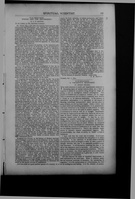HPB-SB-1-59: Difference between revisions
No edit summary |
No edit summary |
||
| Line 98: | Line 98: | ||
{{HPB-SB-footer-footnotes}} | {{HPB-SB-footer-footnotes}} | ||
{{HPB-SB-footer-sources}} | |||
<gallery widths=200px heights=200px> | |||
spiritual_scientist_v.03_n.06_1875-10-14.pdf|page=9|Spiritual Scientist, v. 3, No. 6, October 14, 1875, p. 71 | |||
</gallery> | |||
Latest revision as of 08:07, 27 February 2023
< The Double (continued from page 1-58) >
...

An Enquiry
To The Editor:–May an outsider ask something? Col. Olcott’s letter in the New York Sun of the 18th inst., admits, or states, that some at least of the articles—roses, canaries, etc., — materialized by Mrs. Thayer, were objects already in existence; and that what was done by the powers that aided her, was merely to transport the articles and to deliver them j as described.
Isn’t this a new departure, and isn’t it a backing down from the position assumed by Col. Olcott in his accounts of the Eddy materializations? As I understand his accounts, they are to the effect that the objects produced as well as the bodies of Honto and the rest, were creations of those objects and bodies out of the matter of the circunambient air, and of the body of the medium, that is, re-arrangements of the matter.
Or would Col. Olcott have us believe that there are two kinds of materialization—one that is a creation or re-arrange ment of diffused matter into roses and canaries, and the other that is simple transportation of roses and canaries that grew in the ordinary way?
The importance of this distinction will strike you at once for if the powers concerned can create roses and canaries at all, one is likely to be at a loss to know why they should ever be under the necessity of transporting such as are ready made; and, on the other hand, if the powers cannot create, and can only transport roses and canaries, then a vast mass of so-called facts are swept away.
1 am aware that Col. Olcott claims to have no theory—to tie free from all theories—but that claim does not relieve him from the necessity of arranging his so-called facts, in such way as not to let them destroy one another.
I ask earnestly desiring the truth; for I believe the investigator himself to be pervaded by a desire for truth.
New York, August 20.
From Madame H. P. Blavatsky to her Correspondents
Being daily in receipt of numerous letters—written with the view of obtaining advice as to the best method of receiving information respecting Occultism, and the direct relation it bears to modern Spiritualism, and not having sufficient time at my disposal to answer these requests, I now propose to facilitate the mutual labor of myself and correspondents, by naming herein a few of the principal works treating upon magiism, and the mysteries of such modern Hermetists.
To this I feel bound to add, respecting what I have stated before, to wit: that would-be aspirants must not lure themselves with the idea of any possibility of their becoming practical Occultists by mere book-knowledge. The works of the Hermetic Philosophers were never intended for the masses, as Mr. Charles Sotheran, one of the most learned members of the Society Rosae Crucis, in a late essay, thus observes: “Gabriele Rossetti in his Disquisitions on the Anti-Papal Spirit, which produced the Reformation, shows that the art of speaking and writing in a language which bears a double interpretation, is of very great antiquity; that it was in practice among the priests of Egypt, brought from thence by the Manichees, whence it passed to the Templars and Albigenses, spread over Europe, and brought about the Reformation.”
The ablest book that was ever written on Symbols and Mystic Orders, is most certainly Hargrave Jennings’ The Rosicrucians, and yet it has been repeatedly called “obscure trash” in my presence, and that too, by individuals who were most decidedly well-versed in the rites and mysteries of modern Freemasonry. Persons who lack even the latter knowledge, can easily infer from this, what would be the amount of information they might derive from still more obscure and mystical works than the latter; for if we compare Hargrave Jennings’ book with some of the mediaeval treatises and ancient works of the most noted Alchemists and Magi, we might find the latter as much more obscure than the former—as regards language—as a pupil in celestial Philosophy would the Book of the Heavens, if he should examine a far distant star with the naked eye, rather than with the help of a powerful telescope.
Far from me, though, the idea of disparaging in anyone the laudable impulse to search ardently after Truth, however arid and ungrateful the task may appear at first sight; for my own principle has ever been to make the Light of Truth, the beacon of my life. The words uttered by Christ eighteen centuries ago: “Believe and you will understand,” can be applied in the present case, and repeating them with but a slight modification, I may well say: “Study and you will believe.”
But to particularize one or another Book on Occultism, to those who are anxious to begin their studies in the hidden mysteries of nature is something, the responsibility of which, I am not prepared to assume. What may be clear to one who is intuitional, if read in the same book by another person, might prove meaningless. Unless one is prepared to devote to it his whole life, the superficial knowledge of Occult Sciences will lead him surely to become the target for millions of ignorant scoffers to aim their blunderbusses, loaded with ridicule and chaff, against. Besides this, it is in more than one way dangerous to select this science as a mere pastime. One must bear forever in mind the impressive fable of Oedipus, and beware of the same consequences. Oedipus unriddled but one-half of the enigma offered him by the Sphinx, and caused its death; the other half of the mystery avenged the death of the symbolic monster, and forced the King of Thebes to prefer blindness and exile in his despair, rather than face what he did not feel himself pure enough to encounter. He unriddled the man, the form, and had forgotten God—the idea.
If a man would follow in the steps of Hermetic Philosophers, he must prepare himself beforehand for martyrdom. He must give up personal pride and all selfish purposes, and be ready for everlasting encounters with friends and foes. He must part, once for all, with every remembrance of his earlier ideas, on all and on everything. Existing religions, knowledge, science must rebecome a blank book for him, as in the days of his babyhood, for if he wants to succeed he must learn a new alphabet on the lap of Mother Nature, every letter of which will afford a new insight to him, every syllable and word an unexpected revelation. The two hitherto irreconcilable foes, science and theology—the Montecchi and Capuletti of the nineteenth century—will ally themselves with the ignorant masses, against the modern Occultist. If we have outgrown the age of stakes, we are in the heyday, per contra, of slander, the venom of the press, and all these mephitic venticelli of calumny, so vividly expressed by the immortal Don Basilio. To Science, it will be the duty, arid and sterile as a matter of course—of the Cabalist to prove that from the beginning of time there was but one positive Science <... continues on page 1-60 >
Editor's notes
- ↑ image by unknown author. Sea battle.
- ↑ An Enquiry by unknown author, Spiritual Scientist, v. 3, No. 1, September 9, 1875, p. 9
- ↑ From Madame H. P. Blavatsky to her Correspondents by Blavatsky, H. P.; Bellows, Spiritual Scientist, vol. III, pp. 25-7
The article below is published in "A Modern Panarion", p. 49 as "The Search after Occultism".. – Archivist
Sources
-
Spiritual Scientist, v. 3, No. 6, October 14, 1875, p. 71


